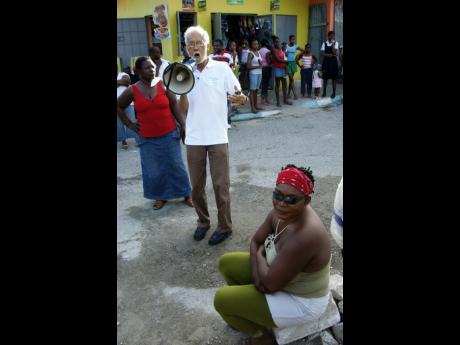PMI pushes ... peace counterculture - Group identifies best practices to reduce violence
As the world marks Youth Month, The Sunday Gleaner, in association with the World Bank, presents a series looking at the challenges and triumphs of the next generation of Jamaicans.
The Peace Management Initiative (PMI) has, since its inception in 2002, been tackling what is often held as Jamaica's number one problem: the high murder rate.
In working to broker and maintain peace in violent communities, the PMI maintains that it is vital to approach the problem not as a community violence problem, but a narrow issue of gang violence.
PMI head Damian Hutchinson explains this is because within these communities exists a
subculture of violence passed down through political and social history.
"In our history, both political parties have armed gangs and socially engineered 'garrison' communities to ensure that they deliver votes en masse at election time, a practice which remains to this day. Turf wars occurring within these political boundaries reinforce the importance of geography," said Hutchinson.
He argued that the peace-building approach of the PMI is a 'counterculture', which in some areas has involved the signing of formal peace treaties, bringing together not just warring gangs but also law-abiding residents.
This began in August Town, St Andrew, where the gangsters themselves had the idea, and the inclusivity inspired residents, who might otherwise be bystanders, to get involved.
"They (the gangsters) asked different stakeholders to come on board to support and to witness that, and in doing that the entire community came out. The community that was so fearful for almost two years came out and was party to that and witnessed that, and participated in that.
"The residents then became empowered by that demonstration and they held the parties, previously in conflict, to account to the elements of the agreement they signed," noted Hutchinson.
"For the PMI, we believe that the violence issue is a social problem in these communities and is a grass-roots violence problem and not so much a gang violence problem," added Hutchinson.
"A lot of these people, they give validation to the guy who might be the don, who might be the leader they are the mothers, they are the sisters, they are the cousins and so the women are very influential and part of the process, and that's why in our interventions we try as best to treat the wider community when engaging gun violence issues, whereas if you treat it as a gang violence issue it's very insular."
Four-pronged strategy
From August Town and other experiences, the PMI has formed its own four-pronged strategy:
1. Violence prevention: mediation and dispute resolution.
2. Therapeutic: treating those affected by violence.
3. Youth mainstreaming: reaching those vulnerable to gang involvement.
4. Healing and reconciliation: involving wider community in peace building.
According to Hutchinson, just as no peace can exist without the full involvement of gangsters, those who others consider 'far gone' can become assets to their communities and peace-building, once they have been constructively engaged and shown alternatives by credible organisations such as the PMI.
"You meet the real people behind the reputations, and a lot of it is a part of the subculture and the history that these families and these communities have inherited, and the roles they play, and so once you open other windows and other doors they are willing to walk through them.
"And, of course, you have those that are not interested and law enforcement has a role to play, there but I would say a huge number about 80 per cent of those persons actively engaged with gun-related violence, if given an alternative opportunity will take it," declared Hutchinson.
Whether as formal as the peace treaty signed in August Town or not, the PMI would like to see a similar approach throughout Jamaica.
"Certainly, there has to be an engagement of the people and have them come together and establish for themselves what are the priorities in terms of peace-building, what are the main risks to the safety of the community right now, and what do we need to do right now to put in place to reduce or remove these risks ... definitely, that's something I'd like to see in each community," said Hutchinson.
Extending the approach
He argued that the area of west Kingston, and in particularly the community of Tivoli Gardens, viewed as the archetypal garrison, would be an ideal place to extend this holistic approach.
Since the 2010 operation in the area by the security forces and the subsequent arrest and extradition of the community leader, Christopher 'Dudus' Coke, the community has become splintered.
"I think that area (Tivoli Gardens) is ripe for it now. You need to be able to redesign that space and it would be an incredible feat to actually have a renewal plan for that space that takes in peace-building, that takes in law enforcement, and also takes in the social development of the space and the empowerment of the people," said Hutchison.
- The World Bank's Next GENDERation Initiative has been working to help young people challenge gender stereotypes that lead to violent behaviour. It is a partnership between the ministries of Education, Youth and Culture, and National Security, the Bureau of Women's Affairs, the Planning Institute of Jamaica, the World Bank and the Inter-American Development Bank.


